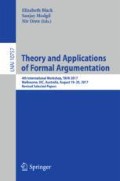Abstract
In human interactions, trust is regularly updated during a discussion. For example, if someone is caught lying, any further utterances they make will be discounted, until trust is regained. This paper seeks to model such behaviour by introducing a dialogue game which operates over several iterations, with trust updates occurring at the end of each iteration. In turn, trust changes are computed based on intuitive properties, captured through three rules. By representing agent knowledge within a preference-based argumentation framework, we demonstrate how trust can change over the course of a dialogue.
Access this chapter
Tax calculation will be finalised at checkout
Purchases are for personal use only
Notes
- 1.
Here, \(\mathcal {E}\) represents the extension(s) obtained on the argumentation framework \(\langle \mathcal {UCS}, \mathcal {R} \rangle \).
References
Amgoud, L., Vesic, S.: Rich preference-based argumentation frameworks. Int. J. Approx. Reason. 55(2), 585–606 (2014)
Bench-Capon, T.J.: Persuasion in practical argument using value-based argumentation frameworks. J. Log. Comput. 13(3), 429–448 (2003)
Bonzon, E., Delobelle, J., Konieczny, S., Maudet, N.: A comparative study of ranking-based semantics for abstract argumentation. In: Proceedings of the 30th AAAI Conference on Artificial Intelligence, pp. 914–920 (2016)
Castelfranchi, C., Falcone, R.: Trust Theory: A Socio-Cognitive and Computational Model, vol. 18. Wiley, Hoboken (2010)
da Costa Pereira, C., Tettamanzi, A.G., Villata, S.: Changing ones mind: erase or rewind? Possibilistic belief revision with fuzzy argumentation based on trust. In: Proceedings of the 22nd International Joint Conference on Artificial Intelligence (2011)
Dix, J., Parsons, S., Prakken, H., Simari, G.: Research challenges for argumentation. Comput. Sci.-Res. Dev. 23(1), 27–34 (2009)
Dung, P.M.: On the acceptability of arguments and its fundamental role in nonmonotonic reasoning, logic programming and n-person games. Artif. Intell. 77(2), 321–357 (1995)
Fullam, K.K., Barber, K.S.: Dynamically learning sources of trust information: experience vs. reputation. In: Proceedings of the 6th International Conference on Autonomous Agents and Multiagent Systems, pp. 164:1–164:8 (2007)
Jøsang, A., Keser, C., Dimitrakos, T.: Can we manage trust? In: Herrmann, P., Issarny, V., Shiu, S. (eds.) iTrust 2005. LNCS, vol. 3477, pp. 93–107. Springer, Heidelberg (2005). https://doi.org/10.1007/11429760_7
Matt, P.A., Morge, M., Toni, F.: Combining statistics and arguments to compute trust. In: Proceedings of the 9th International Conference on Autonomous Agents and Multiagent Systems, pp. 209–216 (2010)
McBurney, P., Parsons, S.: Games that agents play: a formal framework for dialogues between autonomous agents. J. Log. Lang. Inf. 11(3), 315–334 (2002)
Paglieri, F., Castelfranchi, C., Pereira, C.D.C., Falcone, R., Tettamanzi, A., Villata, S.: Trusting the messenger because of the message: feedback dynamics from information quality to source evaluation. Comput. Math. Organ. Theory 20(2), 176 (2014)
Panisson, A.R., Meneguzzi, F., Vieira, R., Bordini, R.H.: Towards practical argumentation-based dialogues in multi-agent systems. In: Proceedings of the IEEE/WIC/ACM International Conference on Web Intelligence and Intelligent Agent Technology, vol. 2, pp. 151–158. IEEE (2015)
Parsons, S., McBurney, P., Sklar, E., Wooldridge, M.: On the relevance of utterances in formal inter-agent dialogues. In: Proceedings of the 6th International Conference on Autonomous Agents and Multiagent Systems, pp. 240:1–240:8 (2007)
Parsons, S., Tang, Y., Sklar, E., McBurney, P., Cai, K.: Argumentation-based reasoning in agents with varying degrees of trust. In: Proceedings of the 10th International Conference on Autonomous Agents and Multiagent Systems, pp. 879–886 (2011)
Spanring, C.: Conflicts in abstract argumentation. Cardiff Argumentation Forum (2016)
Tang, Y., Cai, K., Sklar, E., McBurney, P., Parsons, S.: A system of argumentation for reasoning about trust. In: Proceedings of the 8th European Workshop on Multi-Agent Systems, Paris, France (2010)
Villata, S., Boella, G., Gabbay, D.M., Van Der Torre, L.: A socio-cognitive model of trust using argumentation theory. Int. J. Approx. Reason. 54(4), 541–559 (2013)
Walton, D., Krabbe, E.C.: Commitment in Dialogue: Basic Concepts of Interpersonal Reasoning. SUNY Press, Albany (1995)
Author information
Authors and Affiliations
Corresponding author
Editor information
Editors and Affiliations
Rights and permissions
Copyright information
© 2018 Springer International Publishing AG, part of Springer Nature
About this paper
Cite this paper
Ogunniye, G., Toniolo, A., Oren, N. (2018). A Dynamic Model of Trust in Dialogues. In: Black, E., Modgil, S., Oren, N. (eds) Theory and Applications of Formal Argumentation. TAFA 2017. Lecture Notes in Computer Science(), vol 10757. Springer, Cham. https://doi.org/10.1007/978-3-319-75553-3_15
Download citation
DOI: https://doi.org/10.1007/978-3-319-75553-3_15
Published:
Publisher Name: Springer, Cham
Print ISBN: 978-3-319-75552-6
Online ISBN: 978-3-319-75553-3
eBook Packages: Computer ScienceComputer Science (R0)

